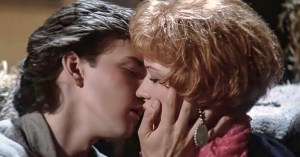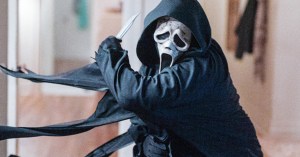Rank Michelle Williams’ 10 Best Movies
We count down the best-reviewed work of the All the Money in the World star.
From a prime-time soap sweetheart on Dawson’s Creek to a film star with four Academy Award nominations (and counting) under her belt, Michelle Williams has come a long way over the course of her impressive career — and this weekend, she returns in one of the year’s most curiously anticipated dramas, All the Money in the World. We decided now would be the perfect time to take an appreciative look back at some of her proudest critical moments, and you know what that means: It’s time to Total Recall, Michelle Williams style!
1.

(Photo by Claire Folger/Roadside Attractions)
Michelle Williams may have a bit of a rep for choosing sad scripts at this point, but as much as we might like to see her laugh onscreen once in a while, she definitely knows how to pick ’em. Witness 2016’s Manchester by the Sea, an awards-season favorite about a man in the midst of a personal and professional drift (Casey Affleck) who’s called back to his hometown after the death of his brother (Kyle Chandler) leaves him with custody of his nephew (Lucas Hedges). This homecoming forces a reckoning with a painful past — part of which involves facing up to his ex-wife (Williams, who earned her fourth Oscar nomination). It’s all sobering stuff, but it isn’t just sad for the sake of being sad; as Ty Burr wrote for the Boston Globe, “The sadness of Manchester by the Sea is the kind of sadness that makes you feel more alive, rather than less, to the preciousness of things.”
2.

(Photo by Miramax Films)
The end of Dawson’s Creek in 2003 freed up Williams to pursue film work full-time — and she didn’t miss a beat while stepping into the next phase of her career, scoring a supporting role in the critically adored The Station Agent. Starring Peter Dinklage as Fin, a reclusive hobby-shop worker who moves into an abandoned train depot after learning his boss has willed it to him, only to discover it isn’t quite the secluded source of isolation he’d hoped for, Agent is part sweet comedy, part tender drama, and most of all a smartly written showcase for the gifts of its impeccably chosen cast, which included Patricia Clarkson and Williams as two damaged women who enter Fin’s orbit. “The Station Agent never leaves its sleepy patch of New Jersey,” mused Salon’s Charles Taylor. “But when it’s over, you know you’ve been somewhere.”
3.

(Photo by Nicole Rivelli/IFC Films)
Williams has worked with writer-director Kelly Reichardt on multiple occasions, and where these two lead, critics tend to follow — a bond that proved more powerful than ever with the release of 2016’s Certain Women, a dramatic triptych based on stories by author Maile Meloy. Tracing the intersecting lives of three women in small-town Montana, Women found Williams sharing screentime with Laura Dern and Kristen Stewart — and given the critical pedigree boasted by this trio, the reviews read pretty much exactly the way you’d expect. “Certain Women burns slow, but it leaves behind a mysterious, shimmering aura,” wrote Stephanie Zacharek for Time. “You feel you know these women — even if their feelings are at times elusive even to themselves.”
4.

(Photo by Paramount Pictures)
Before Williams scored her big breakout role in the primetime soap Dawson’s Creek, she picked up a couple of noteworthy parts as a child actor — including Paramount’s 1994 Lassie update. Produced by Lorne Michaels and helmed by Beverly Hills Cop screenwriter Daniel Petrie, the ‘90s version of the venerable family-friendly franchise wasn’t as “extreme” as its credits might suggest; instead, it offered young audiences another of the warm, resolutely traditional animal-aided adventures the series has always been known for. That was more than enough for most critics, including Roger Ebert, who mused, “It’s somehow reassuring, these days, to see a movie where there’s no problem Lassie can’t solve.”
5.

(Photo by Focus Features)
Williams earned her first Academy Award nomination for her work in Brokeback Mountain, Ang Lee’s critically lauded adaptation of the Annie Proulx short story about a pair of Wyoming ranch hands (played by Jake Gyllenhaal and Heath Ledger) whose forbidden love for one another sparks decades of largely unspoken anguish. Like many of Williams’ films, it isn’t exactly a feelgood picture, but its performances offer rich rewards; as Ray Bennett put it for the Hollywood Reporter, “The fine details of the West are as precise as you would expect from a McMurtry piece, and Lee’s adroitness with the excellent cast is on full display, particularly in the brave and moving performances of Ledger and Gyllenhaal.”
6.

(Photo by Davi Russo/The Weinstein Company)
Sometimes it’s a compliment to say a movie is hard to watch — for example, Derek Cianfrance’s Blue Valentine, which invests audiences in the relationship of a young married couple (played by Williams and Ryan Gosling) even after making it clear that their love is doomed to fail. It’s a cruel trick, but one pulled off with an undeniably dark beauty thanks to Williams and Gosling, whose (partially improvised) performances added heft to what might have otherwise been just another drama about a ukulele-strumming alcoholic’s broken marriage. Saying it “has a palpable air of claustrophobic danger,” Moira Macdonald of the Seattle Times wrote, “You constantly expect something terrible to be happening to these characters. And, indeed, something does.”
7.

(Photo by Oscilloscope Pictures courtesy Everett Collection)
A wagon train heads through the great American wilderness with a hopelessly incompetent guide leading the way: It might sound like the setup for a dreadful ‘90s comedy, but in the hands of director Kelly Reichardt (working from a screenplay by Jonathan Raymond), Meek’s Cutoff served up gritty, historically based drama for fans of Westerns that focus more on period detail than rootin’ and/or tootin’. Featuring a bonnet-wearing, buckboard-riding Williams in the midst of talented veterans like Bruce Greenwood, Shirley Henderson, and Paul Dano, Cutoff captivated critics like Ben Sachs of the Chicago Reader, who suggested, “Imagine a collaboration between John Ford and Wallace Stevens, and you might get a sense of what Kelly Reichardt pulls off here: a sincere re-creation of the pioneer experience, brought to life through careful, often unexpected detail.”
8.

(Photo by Oscilloscope Pictures courtesy Everett Collection)
Williams has a reputation for picking films that tend toward the depressing end of the dramatic spectrum, and projects like 2008’s Wendy and Lucy are a good example of why. Here, Williams plays a woman who tires of her lonely life in small-town Indiana and decides to set out for a new life in Alaska — but she only gets as far as Oregon before falling victim to a bleak comedy of errors that starts with her car breaking down and doesn’t let up until she’s been arrested and lost her dog. While it might be short on chuckles, director/co-writer Kelly Reichardt’s study of a life gone wrong proved powerfully resonant for critics like the New York Observer’s Andrew Sarris, who wrote, “To her credit, Ms. Reichardt never allows her camera to become a voyeuristic witness to a young woman in distress. Instead, it remains focused on a largely indifferent American landscape of strangers in perpetual motion to nowhere.”
9.

(Photo by Laurence Cendrowicz/The Weinstein Company)
Attempting to portray a screen legend like Marilyn Monroe seems like the kind of thankless task for which a director would need to find an inexperienced actress who didn’t know any better — but fortunately for Simon Curtis, whose My Week with Marilyn adapts a pair of Colin Clark memoirs inspired by his time on the set of Monroe’s The Prince and the Showgirl, Michelle Williams was ready and willing to take the job. And while the events that unfold in the movie amount to little more than a footnote in Monroe’s story, her empathetic work in the role helped lift My Week above rote biopic material; as Stephen Whitty put it for the Newark Star-Ledger, “No other actress has quite understood the frustrated, maternal side of Monroe that informed so many of her performances. Or quite recaptured that absolutely luminous quality she had on film.”
10.

(Photo by Michael Gibson/Magnolia Pictures)
Given that she’d already portrayed a marriage in decline in Blue Valentine, it might have seemed like backtracking for Michelle Williams to play another soon-to-be-former spouse in 2012’s Take This Waltz, but Sarah Polley’s bittersweet drama brought a few twists to the table — including casting Seth Rogen as Williams’ cuckolded husband. Featuring solid supporting turns from Luke Kirby and Sarah Silverman, Waltz proved that in the right hands, a familiar tale can still ring true — even when it’s populated with characters the audience may not always like — as long as it’s willing to tell the truth. As Bill Goodykoontz put it in his review for the Arizona Republic, “If uncompromising honesty is the quality you seek for a film, Michelle Williams is your go-to star.”









